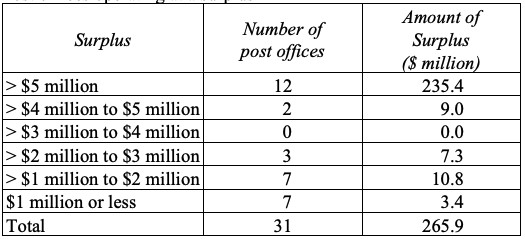MR CHAN KIN-POR (in Chinese): President, Hongkong Post (HKP) is operating under the trading fund mode on a self-financing basis. In 2012-2013, the operating loss of the trading fund amounted to about $114 million, representing a significant increase compared with the loss of about $50 million in 2011-2012. After taking into account other revenues, for example, interest income from notes, placement with the Exchange Fund and bank deposits, the trading fund recorded a small surplus in those two years. In this connection, will the Government inform this Council:
(1) among the 128 post offices across the territory, of the respective numbers of those operating at a profit and those operating at a loss in 2012-2013, as well as the amount of profit/loss made by each post office; whether the authorities established any new post office and closed down loss-making one in the past five years; if they did, of the details and numbers; whether the authorities have analyzed in detail the reasons for individual post offices incurring substantial loss; whether there is any plan in the coming year to close down post offices operating at a substantial loss; if there is such a plan, of the details; if not, the reasons for that;
(2) whether the authorities have assessed in detail the current financial position (including sustainability) of the trading fund and the quality of postal services; if they have, of the outcome; if not, the reasons for that; of the business development plan and measures that the HKP will adopt in the coming year to reduce or reverse the operating loss, in order to avoid affecting the quality of postal services; and
(3) whether the authorities have any plan to develop new businesses in the coming year, for example, re-examining the feasibility of providing deposit and withdrawal services at post offices, in order to increase the sources of revenue and enhance business performance; if they have such a plan, whether the authorities have studied how the new businesses will affect the efficiency of postal services; if they have studied, of the details; if not, the reasons for that?
SECRETARY FOR COMMERCE AND ECONOMIC DEVELOPMENT (in Chinese): President,
(1) In 2012-2013, of the 128 post offices (including two mobile post offices) operated by the HKP, 31 of them operated at a surplus and 97 of them operated at a deficit. The details are set out below:
Post offices operating at a surplus
Post offices operating at a deficit
For those loss-making post offices, the operating revenue could not cover the persistent rise in the major operating costs (for example, staff costs and rental costs).
From 2009 to 2013, the HKP has not closed down any post offices or set up any new ones. Currently, the HKP has no concrete plan to close down post offices in the coming year. However, the HKP will continue to closely monitor the service needs and operating situation of individual post offices, and ensure that limited resources would be efficiently used to provide quality and reliable postal services to the public at affordable prices.
(2) and (3)
In recent years, the major operating costs (including staff costs, air conveyance costs and terminal dues) of the HKP have been increasing. Coupled with the fact that most of the principal postage rates and various postal fees had not been adjusted for years, despite the overall increase in mail traffic, the increase in operating revenue could not offset the escalating operating costs. HKP recorded an operating loss in 2011-2012 and 2012-2013.
To improve the financial position, as a trading fund department, the HKP has been pursuing and would continue to pursue various measures to generate revenue, control costs and increase productivity. On revenue generation, the HKP has been launching new services and enhancing existing services in response to customers’ needs, for example, introducing services targeting Internet traders, launching new international express services, enhancing direct mail services, making better use of surplus space in branch offices (for example, letting space to banks for placing automatic teller machines) and revitalizing the philatelic market. On cost control, the HKP has continued its efforts to contain air conveyance costs. Measures include, for instance, reviewing the specifications of tender invitation for air conveyance service in order to encourage more competition. It has also been negotiating bilateral agreements with other postal administrations with a view to reducing terminal dues payments. In addition, the HKP has been enhancing its productivity through automation, streamlining work procedures and improving manpower deployment.
In October and December 2013, the HKP has increased various principal postage rates and postal fees respectively in order to broadly recover the cumulative inflation since the respective last adjustments. However, the one-off increase in the principal postages rates and postal fees would not be sufficient to ensure the longer term financial sustainability of the HKP. Therefore, whilst it would continue to explore new sources of revenue, control costs and enhance productivity, the HKP would periodically review the need to adjust the postage rates having regard to relevant factors such as the HKP’s financial position, the prevailing economic conditions and business environment, and the affordability of the public, and so on.


